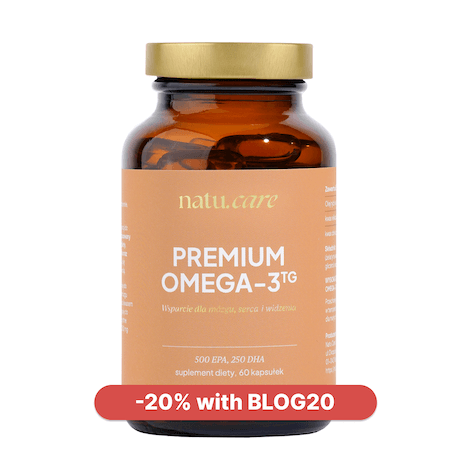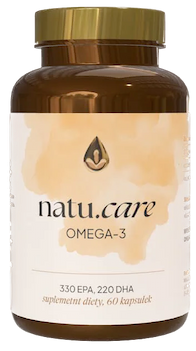Chronic inflammation of the body - what it is, symptoms, treatment
Chronic inflammation of the body is a dangerous inflammation that does not go away for several months to several years.


Learn more about our editorial process
.

Learn more about our editorial process
.

Learn more about our editorial process
.

Learn more about our editorial process
.
Why you can trust us
Articles on Natu.Care are written based on scientific research, data from government websites and other reliable sources. The texts are written in cooperation with doctors, nutritionists and other health and beauty experts. Articles are reviewed before publication and during significant updates.
.Learn more about our editorial process
.Information about advertisements
Content on Natu.Care may contain links to products from the sale of which we may receive a commission. When creating content, we adhere to high editorial standards and take care to be objective about the products discussed. The presence of affiliate links is not dictated by our partners, and we select the products we review ourselves completely independently.
.Learn more about our terms and Conditions
.Inflammation is your body's natural response to a threat or injury. It is what makes you able to fight various infections such as colds.
The problem arises when your body does not stop sending out inflammatory cells, even though the external threat is long gone. That's when you're dealing with chronic inflammation.
That's a very dangerous condition.
This is a very dangerous reaction of your body, so together with Ilona Krzak, MSc, we will introduce you to its causes, symptoms and potential treatment.
From this article you will learn:
- What inflammation is, what types of inflammation there are and why it is dangerous.
- What causes it and what it is and why it is dangerous.
- What causes it and how it manifests itself. .
- In which areas of the body is chronic inflammation most common. .
- What diseases it can result in and how it is treated. .
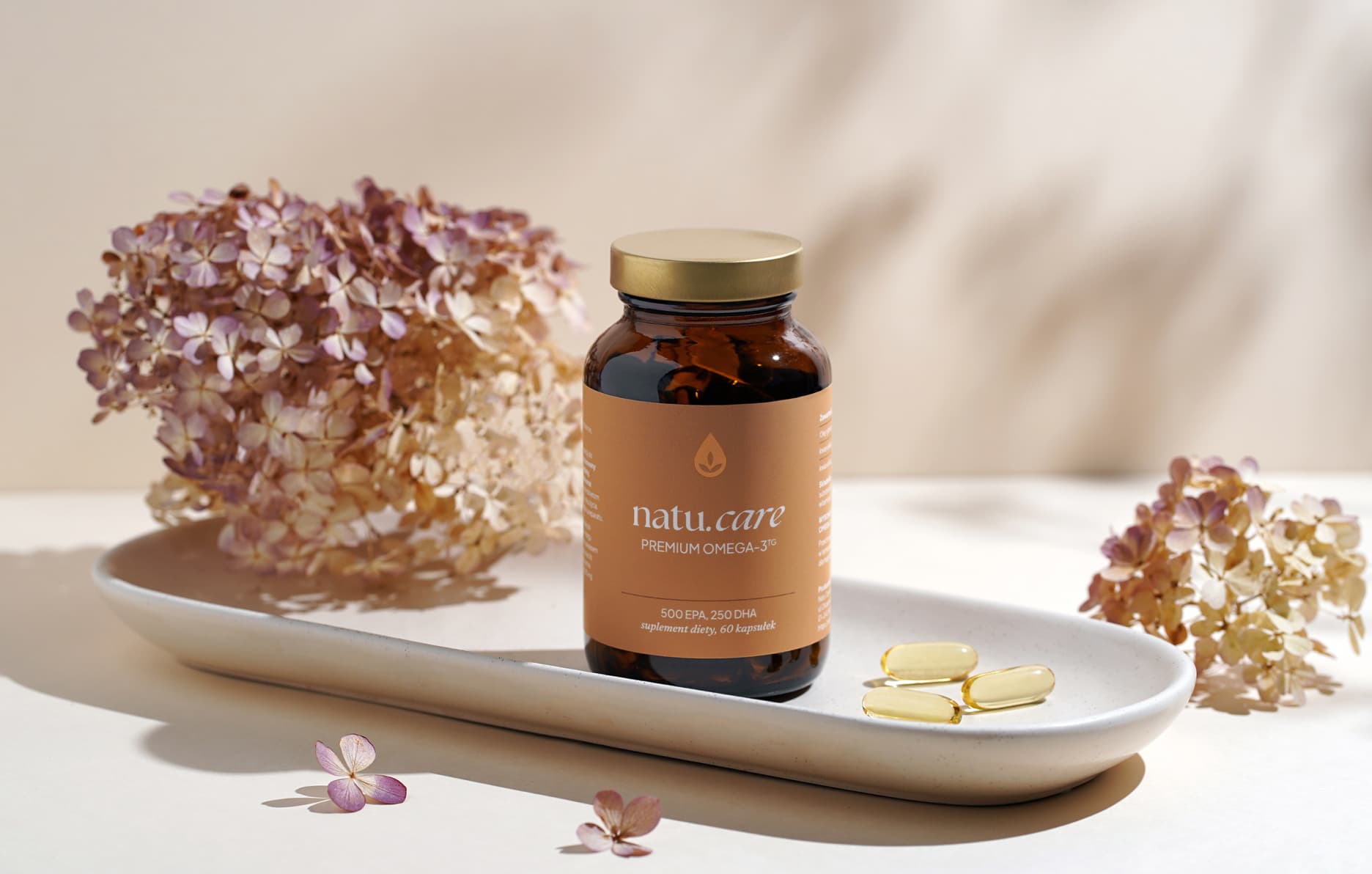
Sprawdź, za co pokochały go tysiące klientek Natu.Care Premium Omega-3ᵀᴳ -15% z kodem BLOG15
Natu.Care Omega-3ᵀᴳ Premium
Natu.Care Omega-3ᵀᴳ Premium dla zdrowia serca, mózgu i odporności. Najlepsza przyswajalność. Optymalna dawka 750 mg. Przebadana przez niezależne laboratorium.
Zobacz więcej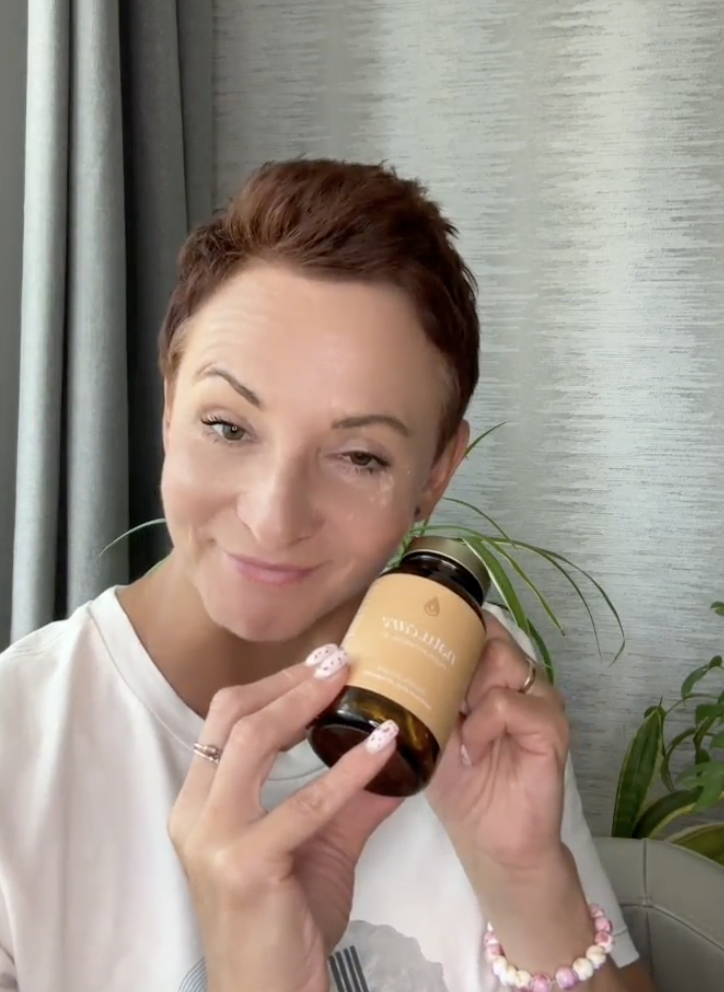
Produkt ma super skład, transparentną etykietę i co dla mnie jest ważne – małe kapsułki do połknięcia. Nie ma też nieprzyjemnego efektu odbijania rybą, który miałam spożywając inne produkty. Widzę znaczną poprawę odporności. Polecam!@Kasia P.
See also:
- Antioxidants
- Oxidative stress
- Tennis elbow
- Psoriatic arthritis
- Hypothyroidism
- Hypothyroidism
- Hashimoto's disease
- What is thyroid
What is chronic inflammation?
Chronic inflammation, also known as long-term, slow inflammation, is a protracted response by the immune system. Your body triggers it, for example, because of a disruption in its function, tissue damage or a violation of homeostasis .
Most often, chronic inflammation is characterised by an insignificant severity, but occurs over several months or even years. When not treated properly, it can lead to dangerous conditions such as heart disease, type II diabetes and even cancer .
What is the difference between chronic inflammation and acute inflammation?
Acute and chronic inflammation are two dangerous conditions of the body that at first glance appear similar. Despite this, they are characterised by a number of important differences.
Origorous inflammation usually occurs as the body's response to injury or infection. It is short-lived - lasting from a few minutes to a few days. It can be intense but ends quickly as the body removes pathogens and repairs the damage .
On the other hand, chronic inflammation is a long-term process that can last weeks, months or even years. It is often the result of an unresolved acute inflammatory response or a condition that causes ongoing irritation, such as chronic illness, long-term infection or exposure to irritants .
What leads to chronic inflammation?
Most body problems have a cause. Chronic inflammation is no different. What leads to it?
Why does it cause chronic inflammation?
Regular exposure to external toxins such as tobacco smoke increases the risk of chronic inflammation.
|
Autoimmune diseases . |
In people with autoimmune diseases, the immune system attacks the body's healthy cells, resulting in chronic inflammation. |
The immune system attacks the body's healthy cells, resulting in chronic inflammation. |
|
Chronic stress . |
Permanent stress can contribute to the creation of inflammation by affecting the body's immune response. |
|
|
Inappropriate diet |
A diet high in saturated fat, simple sugars and low in fibre adversely affects the body's function. |
Diet high in saturated fat, simple sugars and low in fibre adversely affects the body's function. |
|
Obesity |
Overabundance of body fat, especially in the abdominal area, is one of the factors in chronic inflammation. |
|
|
Exposure to toxins . |
Regular exposure to external toxins such as tobacco smoke increases the risk of chronic inflammation. |
|
|
Chronic infections |
In some cases, the body is unable to completely rid itself of the infection - this results in prolonged inflammation. |
The body's excessive inflammatory response to pathogens is very dangerous. We all saw this during the last pandemic - people died due to the body's overly strong response that destroyed the lower respiratory tract..
 .
.
Ilona Krzak Master of Pharmacy
.
Fat tissue itself produces mediators of inflammation. This is why its reduction is so important in the treatment of pre-diabetes, diabetes or circulatory failure, adds pharmacist.
What are the symptoms of chronic inflammation?
.
Symptoms of chronic inflammation vary according to its location, severity, and the characteristics of the patient's body. However, there are a few symptoms that are present in most people. What should raise your concern?
.
- Chronic fatigue. A constant feeling of exhaustion that does not disappear even after rest is a common symptom of chronic inflammation. Fatigue most often affects the ability to work normally and carry out daily activities. Chronic exhaustion usually results from the immune system's constant effort to deal with inflammation .
- Pain. Pain, especially in joints or muscles, often occurs during chronic inflammation. It can be constant or come and go. In most cases, it is caused by continuous inflammatory factors that irritate the nerves in the affected areas . .
- Mood disorders. There is growing evidence that chronic inflammation can have a major impact on mental health. Inflammation affects the brain, contributing to symptoms such as feelings of anxiety and mood volatility .
- Difficulties with concentration. Chronic inflammation affects not only the body, but also the brain. Therefore, it can lead to problems with concentration, memory and other cognitive functions. Sometimes people with chronic inflammation develop what is known as brain fog - a condition characterised by feelings of disorientation and difficulty concentrating .
- Sleep disorders. Problems falling asleep, waking frequently during the night, restless sleep or feeling sleep deprived upon awakening can all be associated with chronic inflammation. Typically, it is the restlessness or pain caused by inflammation that can make it difficult to fall asleep, or to get a deep sleep .
- Gastrointestinal problems. Chronic inflammation also affects the digestive tract, leading to symptoms such as abdominal pain, constipation, diarrhoea, bloating or nausea. In most cases, it is caused by digestive problems or dysbiosis, a disruption of the gut flora .
Although the symptoms listed above may indicate chronic inflammation, remember that they can also occur in many other conditions and diseases. These symptoms are quite general and can therefore be associated with many different factors, not just inflammation.
Therefore, if you notice one or more of these symptoms in yourself, you should always consult your doctor. Only a professional medical assessment and possible investigations can lead to a correct diagnosis and appropriate treatment.
Inflammation is also present during the so-called hangover. Acetaldehyde formed as a result of alcohol metabolism leads to inflammation of the liver, pancreas, brain, gastrointestinal tract and other organs. Therefore, alcohol should be consumed judiciously or not at all..
 .
.
Ilona Krzak Master of Pharmacy
.
Where does chronic inflammation most commonly occur?
.
Chronic inflammation can occur virtually anywhere in the body, but there are a few areas that are particularly frequently affected by it. Some of these include, for example, the endometrium, throat, sinuses, vagina, cervix, thyroid, teeth and tonsils.
Gastric
.
Severe gastritis is most commonly caused by the bacterium Helicobacter pylori, which colonises the stomach. Other causes include long-term use of certain agents such as non-steroidal anti-inflammatory drugs, excessive alcohol consumption, smoking or stress .
Symptoms of chronic gastritis can vary, but most commonly include abdominal pain, a feeling of fullness, nausea, vomiting, heartburn and loss of appetite .
Chronic gastritis, if left untreated, can lead to more serious conditions such as ulcers or cancer.
Treatment of chronic gastritis depends on the cause and usually includes treatment of H. pylori infection, lifestyle changes (elimination of smoking, alcohol, stress), possible changes in medication and taking gastric acid suppressants .
.
Alcohol causes haemorrhagic gastritis. And no, it does not decontaminate the digestive tract as many people assure you..
 .
.
Ilona Krzak Master of Pharmacy
.
Endometrium
.
Permanent inflammation of the endometrium usually results from a bacterial infection accompanied by local inflammation. In some women, this condition may produce no symptoms, while in others it leads to unpleasant symptoms such as :
- unusual vaginal bleeding, .
- pain in the lower abdomen, .
- problems with fertility, .
Chronic endometritis can also cause the formation of endometrial polyps (small outgrowths in the endometrium) and can even lead to the development of endometrial cancer.
Treatment of chronic endometrial inflammation usually includes antibiotics to combat the resulting infection. Sometimes drugs are also used to control inflammatory reactions. In extreme cases, surgical removal of the uterus (hysterectomy) .
Regular screening, such as cytology, allows for early detection of any endometrial abnormalities.
Throat
.
Permanent inflammation of the throat can be caused by many factors. Most commonly, however, it is led by chronic or recurrent viral or bacterial infections, such as tonsillitis.
Symptoms of chronic pharyngitis include :
.
- pain or discomfort in the throat, .
- difficulty swallowing, .
- hoarseness, .
- prolonged cough,
- difficulty coughing, .
- enlarged lymph nodes in the neck, .
Unmedicated chronic inflammation of the throat, leads to more serious health problems such as sleep apnoea (caused by enlarged tonsils) or chronic infection that can invade other parts of the body.
Chronic pharyngitis is most often treated by fighting the infection (if it exists) with antibiotics and painkillers. Symptomatic treatment with throat rinses, for example, is also used. In more severe cases, where infections regularly cause serious problems, the doctor may suggest removal of the tonsils .
Chronic inflammation can also be caused by consuming drinks or foods that are too hot. This negatively affects the mucous membrane of the gastrointestinal tract, which is an open gateway to infection. The mucous membrane has to constantly regenerate, which in the long term can result in metaplasia and cancerous processes..
 .
.
Ilona Krzak Master of Pharmacy
.
Inflammation
.
Severe sinusitis is usually caused by bacterial or viral infections, but can also be the result of allergies or other factors such as nasal polyps or a deviated nasal septum.
Symptoms of chronic sinusitis include :
- chronic rhinitis, .
- pain or discomfort in the facial area (especially around the forehead and nose), .
- sneezing, .
- clogged nose, .
- loss of smell, .
Some people may also experience additional symptoms, such as headaches, fatigue or trouble sleeping.
Severe sinusitis is usually treated with antihistamines, nasal corticosteroids, saline rinses and, in some cases, antibiotics.
There are some cases of chronic sinusitis.
In worse cases, if pharmacological treatment is unsuccessful, surgical treatment may be necessary.
Sinusitis can also result from poor dental health - decaying cavities, inflammation..
 .
.
Ilona Krzak Master of Pharmacy
- .
Vaginitis
- .
Severe vaginitis, also known as chronic vaginosis, is a condition in which the natural balance of bacteria in the vagina is disrupted, leading to chronic inflammation.
Most often it is caused by an excess of bacteria of the species Gardnerella vaginalis, which outcompete the naturally predominant bacteria Lactobacillus. This results in symptoms such as :
- pruritus, .
- burning, .
- discomfort, .
- unusual discharge, .
- unpleasant odour, .
Prolonged vaginal inflammation, especially if not properly treated, leads to more serious health problems such as increased risk of sexually transmitted infections, pelvic inflammatory disease and fertility problems.
There is no single solution for treating chronic vaginitis - it depends on the cause. However, antibiotics or other antimicrobial drugs are most commonly given to help restore the normal vaginal bacterial flora.
There is no single solution for chronic vaginitis.
In maintaining a normal vaginal bacterial flora, it is also important to have appropriate probiotic therapy..
 .
.
Ilona Krzak Master of Pharmacy
- .
Cervix
- .
Cervical chronic inflammation is usually caused by infections, often sexually transmitted, such as chlamydia. Sometimes, however, the cause of chronic cervical inflammation can also be due to inappropriate hormone levels, physical trauma or an allergic reaction.
Symptoms of chronic cervicitis include discharge, pain during intercourse, discomfort in the lower abdomen and abnormal bleeding. However, many women do not experience any visible symptoms .
Chronic cervicitis, if not treated properly, leads to serious complications such as infertility, ectopic pregnancy or an increased risk of cervical cancer.
Thyroid
- .
Severe inflammation thyroiditis -otherwise known as Hashimoto's disease -is an autoimmune condition in which the immune system attacks the thyroid gland, leading to chronic stress on it.
Unusually the initial symptoms are inconspicuous and vague, but over time they can progress to symptoms of hypothyroidism, such as :
- fatigue, .
- cold intolerance, .
- constipation, .
- weight gain, .
- depression, .
- concentration disorders, .
Treatment of chronic thyroiditis usually involves continuous intake of levothyroxine, a thyroid hormone that helps to both control symptoms and prevent possible complications.
Treatment of chronic thyroiditis usually involves continuous intake of levothyroxine, a thyroid hormone that helps to both control symptoms and prevent possible complications.
Some women experience thyroiditis after childbirth. Metabolic disturbances, mood swings or hair loss are some of the symptoms of this condition.
 .
.
Ilona Krzak Master of Pharmacy
- .
Teeth
- .
Chronic inflammation of the teeth, most commonly occurs in the form of chronic pulpitis, or pulpitis, or chronic periodontitis (periodontitis).
Pulpitis is an inflammation of the tissue interior of the tooth caused by decay, mechanical damage or other factors. Symptoms of this condition include. :
- pain, .
- sensitivity to heat and cold, .
- swelling and redness of the gums around the tooth, .
On the other hand, chronic periodontitis, also known as periodontal disease, is a condition in which the gums and other supporting structures of the teeth become inflamed. This can lead to bleeding gums, swelling, pain, bad breath and, in advanced stages, even tooth loss.
The treatment of chronic dental inflammation usually involves dental procedures such as root canal treatment, professional teeth cleaning, following good oral hygiene habits and, in some cases, the use of antibiotics.
People suffering from tooth decay should be especially careful - it is a bacterial and contagious disease. It is therefore very often transmitted through kissing, or even activities such as kissing young children or licking a dummy or cutlery..
 .
.
Ilona Krzak Master of Pharmacy
- .
Malarials
- .
Chronic tonsillitis usually occurs through recurrent bacterial or viral infections. In some cases, it can also be the result of other problems, such as allergies or chronic irritation.
Symptoms of chronic tonsillitis include :
- long-term sore throat, .
- difficulty swallowing, .
- fever, .
- enlarged lymph nodes in the neck,
- difficulty in swallowing,
- difficulty in swallowing,
- fever.
- enlarged, red tonsils, .
The treatment of chronic tonsillitis often depends on the cause. Some people need antibiotics to fight bacterial infections, others need medication to relieve pain and swelling, and the rest need throat rinses.
There is no need for antibiotics.
For severe or recurrent tonsillitis, the doctor may suggest tonsillectomy, a surgical procedure to remove the tonsils.
In what other areas of the body is chronic inflammation common ?
- Joints, .
- skin, .
- neural system, .
- ears, .
- Achilles tendon, .
- macica, .
- gut, .
- prostate, .
- pancreas, .
- .
Why is chronic inflammation dangerous?
- .
Chronic inflammation is dangerous primarily because it leads to many diseases. In addition to this, it can also damage tissues and limit the function of the immune system. Moreover, untreated, long-term inflammation can result in organ dysfunction.
Why chronic inflammation is dangerous ?
- Tissue damage. Inflammation is the body's natural repair process. However, if it becomes chronic, it can lead to tissue destruction due to the constant attack of the immune system.
- Inflammation is the body's natural repair process.
- Chronic diseases. Chronic inflammation can result in many chronic conditions, such as heart disease, diabetes, as well as autoimmune or neurodegenerative conditions (e.g. Alzheimer's disease) and some types of cancer.
- Higher immune system function. If the immune system is consistently stimulated by inflammation, it functions less well, increasing susceptibility to infection.
- Organ dysfunction. Chronic inflammation can also cause organ dysfunction, for example through fibrosis (excessive connective tissue buildup) in organs such as the heart, lungs and kidneys.
Diabetes is a set of diseases that do not occur alone. It usually correlates with being overweight or obese..
 .
.
Ilona Krzak Master of Pharmacy
.
How is chronic inflammation treated?
.
The treatment of chronic inflammation always depends on the basis of the disease, the patient's current condition, as well as other factors. Nevertheless, there are a few general principles that are often used in this process .
- Anti-inflammatory drugs. Agents such as non-steroidal anti-inflammatory drugs (NSAIDs) are often the first step in the treatment of chronic inflammation. They inhibit the production of inflammatory mediators that cause inflammation, which can help to reduce unpleasant symptoms.
- Lifestyle changes. Incorporating healthy eating habits, regular physical activity, stress management and ensuring adequate length and sleep hygiene are also important elements of treatment against chronic inflammation. These changes can help to boost the body's overall immunity and reduce chronic inflammation.
- Specific medications. Depending on the cause of the chronic inflammation, for example with rheumatoid arthritis or Crohn's disease, doctors may prescribe specific medications to effectively combat the condition. These may be disease-modifying agents such as methotrexate or biologic drugs.
- Physical therapy. If chronic inflammation affects mobility, physiotherapy or massage, for example, may be necessary. These methods help to increase the patient's range of motion, muscle strength and general wellbeing.
- Surgery. In some cases, when other treatment methods prove insufficient, surgical intervention may be necessary. It is not infrequently the definitive method of treatment, reserved for the most critical conditions. .
Remember to always consult a treatment plan for chronic inflammation with your doctor. Only a specialist can tailor this process to your current condition.
Despite appearances, sleep is one of the most important factors for good health..
 .
.
Ilona Krzak Master of Pharmacy
.
How to detect inflammation
.
Blood tests can help detect chronic inflammation by identifying certain inflammatory markers. The most commonly used tests for this purpose are :
- CRP, or C-reactive protein. This protein is produced by the liver in response to inflammation. CRP levels usually rise when there is inflammation in the body. .
- Biernacki's test (ESR). Test This measures the rate at which red blood cells sink to the bottom of the tube over an hour. A higher result may indicate inflammation in the body.
- Tests for autoimmune antibodies. These tests can detect certain autoimmune diseases that often cause chronic inflammation. Examples include the rheumatoid factor (RF) test, which is used in the diagnosis of rheumatoid arthritis.
Remember that blood tests are only one diagnostic tool, and the results should always be interpreted in the context of other symptoms by a specialist.
The CRP indicator is a good marker of inflammation. Usually laboratories report a range of 0-5 mg/l, which is considered the norm. However, it is worth noting that prolonged values above 3.5 mg/l may increase the risk of cardiovascular incidents. Apparently still the norm, but it can already carry negative consequences..
 .
.
Ilona Krzak Master of Pharmacy
.
On the other hand, it is worth checking the Passer's Reaction together with other inflammation parameters, as it rises slowly and also slowly falls - even over several to several days. Thus, we manage the inflammation and the parameter continues to indicate it. In addition, elderly people or pregnant women may have physiologically elevated ESR levels, advises magister of pharmacy.
How to reduce chronic inflammation on your own?
.
Chronic inflammation is a dangerous problem that should always be addressed by a doctor. However, if you have already received recommendations, it is worth doing something more to speed up the recovery process. How to reduce chronic inflammation ?
- Lifestyle changes. Maintaining healthy habits such as regular exercise and getting enough sleep can reduce inflammation.
- Consider the following.
- Anti-inflammatory diet. A diet rich in anti-inflammatory foods such as fruits, vegetables, fish rich in omega-3 fatty acids and low in processed foods is beneficial not just for people with inflammation, but for everyone.
- Manage stress. Practising relaxation techniques and managing stress can reduce inflammation, as stress contributes to its maintenance.
- Avoiding stimulants. Alcohol, tobacco and other stimulants increase inflammation in the body. Avoiding these substances can alleviate chronic inflammation.
- Maintain a healthy body weight. Excess body fat, especially belly fat, can contribute to chronic inflammation. Maintaining a healthy body weight can help reduce inflammation.
What diet to follow for chronic inflammation?
.
Adequate diet is important for everyone. But for people with chronic inflammation, it gets especially important. What's worth eating when you're struggling with this problem?
.
|
Omega-3 fatty acids . |
Omeega-3 fatty acids have natural anti-inflammatory properties, so they may help relieve chronic inflammation. |
Ome-3 fatty acids have natural anti-inflammatory properties, so they may help relieve chronic inflammation. |
|
|
|
Antioxidants neutralise harmful oxidative stress, which can cause inflammation and tissue damage. |
|
|||
|
Fiber |
Fiber promotes gut health, which can support the fight against inflammation - especially with autoimmune diseases that are related to the gastrointestinal tract. |
|
||
|
Probiotics and prebiotics |
Probiotics and prebiotics support gut health by promoting good bacteria, which reduces the havoc wreaked by chronic inflammation. |
Probiotics and prebiotics support gut health by promoting good bacteria, which reduces the havoc wreaked by chronic inflammation. |
|
|
|
Polyphenols |
Polyphenols exhibit potent anti-inflammatory and antioxidant properties that can help protect the body from chronic inflammation. |
|
For chronic inflammation, I can recommend the Mediterranean diet. It is rich in fibre and vitamins and micronutrients..
 .
.
Ilona Krzak Master of Pharmacy
.
Do ice baths work for chronic inflammation?
.
Ice baths are often used by athletes and people with active lifestyles to reduce inflammation and speed up muscle recovery after intense cardio workouts. Although some studies suggest that they may help reduce chronic inflammation, the evidence is still mixed, with most trials looking at short-term rather than chronic inflammation.
"Walrus" is nothing more than the deliberate induction of shock to the body and inflammation, in order to mobilise the body and build immunity.
 .
.
Ilona Krzak Master of Pharmacy
Best supplements for chronic inflammation
.In some cases, you can support the treatment of chronic inflammation with the right supplements. However, remember, that all remedies you take during treatment should be consulted with your doctor. Here are some supplements that may be helpful during chronic inflammation.
Omega-3 fatty acids
.Product description
The dietary supplement contains omega-3ᵀᴳ, or omega-3 acids in the form of trójglyceridesów. Scientific studies suggest that this form of fatty acidsós up to 2 times better absorbed than the estersós present in many dietary supplements on the market. This means that you are assured of their effectiveness and of supplying yourself with valuable omega acids.
Fatty acids omega-3 are derived from wild anchovy oil. It is a rich source of healthy fats that are essential for the health of the cardiovascular, immune and nervous systems, as well as the proper function of vision, joints muscles.
Scientific research suggests that wild anchovies are a good source of healthy fats.
Scientific research also suggests that an adequate intake of omega-3 fatty acidsós protects against and supports the treatment of depression and anxiety disorders. In addition, omega-3s influence the hydration and appearance of the skinóry and support healthy sleep.
.
The formula contains a total of 750 mg of EPA+DHA acidsós, which is three times higher than the recommended minimum of 250 mg for the Polish population. Omega-3 TG Premium has studies indicating that its TOTOX is 9, which is a very good result.
Supplementation of omega-3 fatty acidsóis recommended for anyone who does not eat 1–2 portions (approximately 300 g) of oily fish per week. Children during growth, seniors, physically active people, vegans and vegetarians, as well as patients undergoing cardiovascular treatment and prevention of heart disease also have an increased need.
Pros and cons
The dietary supplement contains omega-3ᵀᴳ, or omega-3 acids in the form of trójglyceridesów. Scientific studies suggest that this form of fatty acidsós up to 2 times better absorbed than the estersós present in many dietary supplements on the market. This means that you are assured of their effectiveness and of supplying yourself with valuable omega acids.
Fatty acids omega-3 are derived from wild anchovy oil. It is a rich source of healthy fats that are essential for the health of the cardiovascular, immune and nervous systems, as well as the proper function of vision, joints muscles.
Scientific research suggests that wild anchovies are a good source of healthy fats.
Scientific research also suggests that an adequate intake of omega-3 fatty acidsós protects against and supports the treatment of depression and anxiety disorders. In addition, omega-3s influence the hydration and appearance of the skinóry and support healthy sleep.
.
The formula contains a total of 750 mg of EPA+DHA acidsós, which is three times higher than the recommended minimum of 250 mg for the Polish population. Omega-3 TG Premium has studies indicating that its TOTOX is 9, which is a very good result.
Supplementation of omega-3 fatty acidsóis recommended for anyone who does not eat 1–2 portions (approximately 300 g) of oily fish per week. Children during growth, seniors, physically active people, vegans and vegetarians, as well as patients undergoing cardiovascular treatment and prevention of heart disease also have an increased need.
Additional information
The dietary supplement contains omega-3ᵀᴳ, or omega-3 acids in the form of trójglyceridesów. Scientific studies suggest that this form of fatty acidsós up to 2 times better absorbed than the estersós present in many dietary supplements on the market. This means that you are assured of their effectiveness and of supplying yourself with valuable omega acids.
Fatty acids omega-3 are derived from wild anchovy oil. It is a rich source of healthy fats that are essential for the health of the cardiovascular, immune and nervous systems, as well as the proper function of vision, joints muscles.
Scientific research suggests that wild anchovies are a good source of healthy fats.
Scientific research also suggests that an adequate intake of omega-3 fatty acidsós protects against and supports the treatment of depression and anxiety disorders. In addition, omega-3s influence the hydration and appearance of the skinóry and support healthy sleep.
.
The formula contains a total of 750 mg of EPA+DHA acidsós, which is three times higher than the recommended minimum of 250 mg for the Polish population. Omega-3 TG Premium has studies indicating that its TOTOX is 9, which is a very good result.
Supplementation of omega-3 fatty acidsóis recommended for anyone who does not eat 1–2 portions (approximately 300 g) of oily fish per week. Children during growth, seniors, physically active people, vegans and vegetarians, as well as patients undergoing cardiovascular treatment and prevention of heart disease also have an increased need.
Expert opinion
The dietary supplement contains omega-3ᵀᴳ, or omega-3 acids in the form of trójglyceridesów. Scientific studies suggest that this form of fatty acidsós up to 2 times better absorbed than the estersós present in many dietary supplements on the market. This means that you are assured of their effectiveness and of supplying yourself with valuable omega acids.
Fatty acids omega-3 are derived from wild anchovy oil. It is a rich source of healthy fats that are essential for the health of the cardiovascular, immune and nervous systems, as well as the proper function of vision, joints muscles.
Scientific research suggests that wild anchovies are a good source of healthy fats.
Scientific research also suggests that an adequate intake of omega-3 fatty acidsós protects against and supports the treatment of depression and anxiety disorders. In addition, omega-3s influence the hydration and appearance of the skinóry and support healthy sleep.
.
The formula contains a total of 750 mg of EPA+DHA acidsós, which is three times higher than the recommended minimum of 250 mg for the Polish population. Omega-3 TG Premium has studies indicating that its TOTOX is 9, which is a very good result.
Supplementation of omega-3 fatty acidsóis recommended for anyone who does not eat 1–2 portions (approximately 300 g) of oily fish per week. Children during growth, seniors, physically active people, vegans and vegetarians, as well as patients undergoing cardiovascular treatment and prevention of heart disease also have an increased need.
Product description
The dietary supplement contains high-quality fatty acids omega-3 from anchovy oil. It is a naturally rich source of healthy fats that are essential for cardiovascular, immune and nervous system health, as well as proper function of eyesight, joints muscles.
Scientific research also suggests that an adequate intake of omega-3 fatty acidsós protects against and supports the treatment of depression and anxiety disorders. In addition, omega-3s influence the hydration and appearance of the skinóry and support healthy sleep.
.
The dietary supplement contains 550 mg EPA+DHA per daily serving. This is more than double the official recommendations for the Polish population, whichóre suggesting an intake of at least 250 mg per day.
Supplementation of EPA+DHA is a good way to support healthy sleep.
Supplementation with omega-3 fatty acidsós is advisable if you do not consume 1–2 portions (approx. 300 g) of oily fish per week. There is also an increased need for physically active people, vegans and vegetarians, seniors, children during growth spurts and patients undergoing cardiovascular treatment and prevention of heart disease.
Pros and cons
The dietary supplement contains high-quality fatty acids omega-3 from anchovy oil. It is a naturally rich source of healthy fats that are essential for cardiovascular, immune and nervous system health, as well as proper function of eyesight, joints muscles.
Scientific research also suggests that an adequate intake of omega-3 fatty acidsós protects against and supports the treatment of depression and anxiety disorders. In addition, omega-3s influence the hydration and appearance of the skinóry and support healthy sleep.
.
The dietary supplement contains 550 mg EPA+DHA per daily serving. This is more than double the official recommendations for the Polish population, whichóre suggesting an intake of at least 250 mg per day.
Supplementation of EPA+DHA is a good way to support healthy sleep.
Supplementation with omega-3 fatty acidsós is advisable if you do not consume 1–2 portions (approx. 300 g) of oily fish per week. There is also an increased need for physically active people, vegans and vegetarians, seniors, children during growth spurts and patients undergoing cardiovascular treatment and prevention of heart disease.
Additional information
The dietary supplement contains high-quality fatty acids omega-3 from anchovy oil. It is a naturally rich source of healthy fats that are essential for cardiovascular, immune and nervous system health, as well as proper function of eyesight, joints muscles.
Scientific research also suggests that an adequate intake of omega-3 fatty acidsós protects against and supports the treatment of depression and anxiety disorders. In addition, omega-3s influence the hydration and appearance of the skinóry and support healthy sleep.
.
The dietary supplement contains 550 mg EPA+DHA per daily serving. This is more than double the official recommendations for the Polish population, whichóre suggesting an intake of at least 250 mg per day.
Supplementation of EPA+DHA is a good way to support healthy sleep.
Supplementation with omega-3 fatty acidsós is advisable if you do not consume 1–2 portions (approx. 300 g) of oily fish per week. There is also an increased need for physically active people, vegans and vegetarians, seniors, children during growth spurts and patients undergoing cardiovascular treatment and prevention of heart disease.
Expert opinion
The dietary supplement contains high-quality fatty acids omega-3 from anchovy oil. It is a naturally rich source of healthy fats that are essential for cardiovascular, immune and nervous system health, as well as proper function of eyesight, joints muscles.
Scientific research also suggests that an adequate intake of omega-3 fatty acidsós protects against and supports the treatment of depression and anxiety disorders. In addition, omega-3s influence the hydration and appearance of the skinóry and support healthy sleep.
.
The dietary supplement contains 550 mg EPA+DHA per daily serving. This is more than double the official recommendations for the Polish population, whichóre suggesting an intake of at least 250 mg per day.
Supplementation of EPA+DHA is a good way to support healthy sleep.
Supplementation with omega-3 fatty acidsós is advisable if you do not consume 1–2 portions (approx. 300 g) of oily fish per week. There is also an increased need for physically active people, vegans and vegetarians, seniors, children during growth spurts and patients undergoing cardiovascular treatment and prevention of heart disease.
ALLNUTRITION Omega 3 Strong
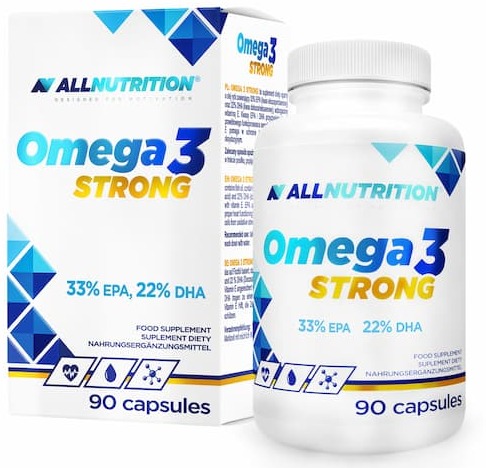
- Content omega-3 acids: 550 mg (DHA 220 mg + EPA 330 mg)
- Additional active ingredients: vitamin E
- Form: capsules .
- Dose: 1 capsule per day .
- Sufficient for: 90 days .
Product description
A dietary supplement with a solid portion of DHA and EPA – valuable for health and well-being omega-3 acidsós. Indicated especially for people on a plant-based diet, physically active people and seniors.
.The sourceóof omega-3 acids in this preparation is fish oil.
.Pros and cons
A dietary supplement with a solid portion of DHA and EPA – valuable for health and well-being omega-3 acidsós. Indicated especially for people on a plant-based diet, physically active people and seniors.
.The sourceóof omega-3 acids in this preparation is fish oil.
.Additional information
A dietary supplement with a solid portion of DHA and EPA – valuable for health and well-being omega-3 acidsós. Indicated especially for people on a plant-based diet, physically active people and seniors.
.The sourceóof omega-3 acids in this preparation is fish oil.
.User review
A dietary supplement with a solid portion of DHA and EPA – valuable for health and well-being omega-3 acidsós. Indicated especially for people on a plant-based diet, physically active people and seniors.
.The sourceóof omega-3 acids in this preparation is fish oil.
.Solgar Omega 3-6-9
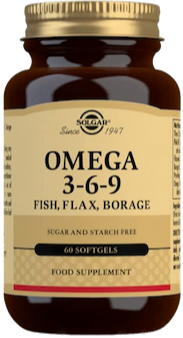
- Content of omega acids:.
- Omega-3 fatty acids.
- Omega-3 fatty acids
- alpha-linolenic acid (ALA) – 585 mg
.- eicosapentaenoic acid (EPA) – 344 mg
- docosahexaenoic acid (DHA) – 221 mg
.
- Omega-3 fatty acids
- Omega-6 fatty acids.
- linoleic acid (LA) – 598 mg .
- gamma-linolenic acid (GLA) – 274 mg .
- Omega-9 fatty acids.
- Oleic acid – 325 mg .
- Omega-3 fatty acids.
- Source of omega acids: fish oil from anchovies, mackerel, sardines, linseed oil, cucumber oil .
- Form: capsules .
- Packaging: 60 capsules .
- Daily allowance:3 capsules per day .
- Sufficient for: 20 days .
Product description
A combination of omega 3-6-9 fatty acidsós derived from fish and plants. The dietary supplement supplements essential omega fatty acids, whichóre needed for the proper functioning of many systemsóorgansóin the body.
Pros and cons
A combination of omega 3-6-9 fatty acidsós derived from fish and plants. The dietary supplement supplements essential omega fatty acids, whichóre needed for the proper functioning of many systemsóorgansóin the body.
Additional information
A combination of omega 3-6-9 fatty acidsós derived from fish and plants. The dietary supplement supplements essential omega fatty acids, whichóre needed for the proper functioning of many systemsóorgansóin the body.
A combination of omega 3-6-9 fatty acidsós derived from fish and plants. The dietary supplement supplements essential omega fatty acids, whichóre needed for the proper functioning of many systemsóorgansóin the body.
Omega + Vitamin D3 800 IU for children
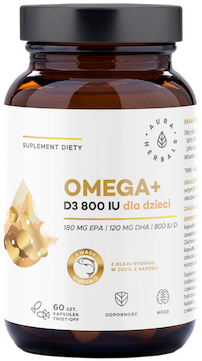
- Content of omega-3 fatty acids: 300 mg (180 mg EPA + 120 mg DHA)
- .
- Additional active ingredients: vitamin D3
- Form: twist-off capsules
- .
- Dose: 1 capsule per day
- .
- Sufficient for: 60 days
- .
Product description
Omega-3 acids for children with added vitamin D3 in good doses. The formula fills the daily requirement of EPA and DHA and vitamin D for children aged 2–18 years.
The Ministry of Health recommends supplementation with vitamin D3. In turn, omega-3 fatty acids are also crucial for the youngest.
The dietary supplement from Aura Herbals supports mós brain function, proper vision and immune system function.
The omega-3 fatty acids are derived from fish oil sourced from anchovies.
Pros and cons
Omega-3 acids for children with added vitamin D3 in good doses. The formula fills the daily requirement of EPA and DHA and vitamin D for children aged 2–18 years.
The Ministry of Health recommends supplementation with vitamin D3. In turn, omega-3 fatty acids are also crucial for the youngest.
The dietary supplement from Aura Herbals supports mós brain function, proper vision and immune system function.
The omega-3 fatty acids are derived from fish oil sourced from anchovies.
Additional information
Omega-3 acids for children with added vitamin D3 in good doses. The formula fills the daily requirement of EPA and DHA and vitamin D for children aged 2–18 years.
The Ministry of Health recommends supplementation with vitamin D3. In turn, omega-3 fatty acids are also crucial for the youngest.
The dietary supplement from Aura Herbals supports mós brain function, proper vision and immune system function.
The omega-3 fatty acids are derived from fish oil sourced from anchovies.
User review
Omega-3 acids for children with added vitamin D3 in good doses. The formula fills the daily requirement of EPA and DHA and vitamin D for children aged 2–18 years.
The Ministry of Health recommends supplementation with vitamin D3. In turn, omega-3 fatty acids are also crucial for the youngest.
The dietary supplement from Aura Herbals supports mós brain function, proper vision and immune system function.
The omega-3 fatty acids are derived from fish oil sourced from anchovies.
{ product:3KOyJcpaAPk2YwN4VI42ih }}
Curcuma
.{ product:2VyxLapXTKSAv8PJiGnQT6 }}
Vitamin D3
.
Sprawdź, za co pokochały go tysiące klientek Natu.Care Premium Omega-3ᵀᴳ -15% z kodem BLOG15
Natu.Care Omega-3ᵀᴳ Premium
Natu.Care Omega-3ᵀᴳ Premium dla zdrowia serca, mózgu i odporności. Najlepsza przyswajalność. Optymalna dawka 750 mg. Przebadana przez niezależne laboratorium.
Zobacz więcej
Produkt ma super skład, transparentną etykietę i co dla mnie jest ważne – małe kapsułki do połknięcia. Nie ma też nieprzyjemnego efektu odbijania rybą, który miałam spożywając inne produkty. Widzę znaczną poprawę odporności. Polecam!@Kasia P.
See also:
.- How to take care of your health
- Deficiency of omega-3 fatty acids
- Vitamin B12 deficiency
- Vitamin D deficiency
- What is anaemia
- What is liver
- Fatty liver
Summary
.- Prolonged inflammation is a long-term immune response of the body.
- Prolonged inflammation is a long-term immune response of the body.
- Factors that lead to chronic inflammation include autoimmune diseases, chronic stress, poor diet, obesity, exposure to toxins and chronic infections.
- The symptoms of chronic inflammation are the following.
- Symptoms of chronic inflammation typically include constant fatigue, pain (especially in the joints and muscles), mood disorders, difficulty concentrating, as well as sleep and gastrointestinal problems.
- Chronic inflammation can occur in various places in the body, e.g. stomach, endometrium, throat, sinuses, vagina, cervix, thyroid gland, teeth, tonsils.
- Treatment of chronic inflammation depends on the cause and most commonly includes anti-inflammatory drugs, lifestyle changes, physical therapy and in some cases surgery. .
- You can influence chronic inflammation through lifestyle changes, an anti-inflammatory diet, stress management, avoiding stimulants and maintaining a healthy body weight. .
- For people with chronic inflammation, a diet rich in omega-3 fatty acids, antioxidants, fibre, probiotics and prebiotics, and polyphenols is beneficial.
FAQ
.What are some home remedies to reduce chronic inflammation?
.Regular exercise, a healthy diet, sufficient sleep can help alleviate chronic inflammation. Including foods rich in omega-3 acids, antioxidants, fibre, probiotics and polyphenols in the diet is also beneficial for people with chronic inflammation.
Does CBD help with chronic inflammation?
.Yes, CBD (cannabidiol) is often used as an anti-inflammatory. Some studies suggest that CBD oil may help chronic inflammation by reducing the production of pro-inflammatory cytokines and modulating immune cell activity.
Nevertheless, further study of this compound is needed for a full understanding of its action and potential side effects.
Does an unhealthy lifestyle lead to chronic inflammation?
.Yes, an unhealthy lifestyle, including factors such as inappropriate diet, lack of physical activity, stress, smoking or excess alcohol, can lead to chronic inflammation. Among other things, this is related to the production of harmful free radicals and pro-inflammatory cytokines, which contribute to inflammation at the molecular level.
What skin disease is characterised by chronic inflammation?
.Atopic dermatitis, also known as eczema, is a skin disease characterised by chronic inflammation. It manifests as dry, itchy skin and redness, and in some cases can lead to worsening of the skin condition.
The causes of atopic dermatitis include genetic factors, environmental factors and skin barrier dysfunction. The problem is common in children, but can also affect adults.
The problem is common in children, but can also affect adults.
Does chronic inflammation lead to weight gain?
.Yes, chronic inflammation can contribute to weight gain. Inflammatory processes in the body can interfere with the normal functioning of hormones that regulate appetite and metabolism.
What are the causes of chronic inflammation?
.Chronic inflammation does not always have a single, clearly defined cause. Inflammation is the body's defence response to a number of different stimuli - both internal and external.
In the case of chronic inflammation, these stimuli occur over a long period of time, which keeps the body in a constant state of readiness. Therefore, the causes of chronic inflammation can range from autoimmune diseases, chronic stress, improper diet, to exposure to toxins or long-term infections.
Is there a specific diagnostic test to detect chronic inflammation?
.There is no single specific test that can unequivocally confirm chronic inflammation. The most commonly used tests to detect chronic inflammation are tests CRP (C-reactive protein) levels and ESR (Passive Reaction), which can indicate the presence of inflammation in the body.
However, these tests are only indicators of the body's general response to inflammation and not specifically of chronic inflammation.
Is chronic inflammation always a bad thing?
.Inflammation is the body's natural defence mechanism and when it works properly, it protects us from harmful substances such as bacteria and viruses. The problem arises when inflammation becomes chronic, which is often due to, for example, an unhealthy lifestyle dominated by stress, a poor diet, little sleep and low levels of physical activity.
Does chronic inflammation always lead to serious health problems?
.Chronic inflammation does not always lead to serious health problems, but usually increases the risk of diseases such as heart conditions, diabetes, autoimmune diseases and some cancers.
Current inflammation can also harm health in a number of other ways, including by damaging tissues and affecting the body's ability to repair and regulate the immune system.
Sources
.See all
.Aoki, T., & Narumiya, S. (2012). Prostaglandins and chronic inflammation. Trends in Pharmacological Sciences, 33(6), 304-311. https://doi.org/10.1016/j.tips.2012.02.004
Baechle, J. J., Chen, N., Makhijani, P., Winer, S., Furman, D., & Winer, D. A. (2023). Chronic inflammation and the hallmarks of aging. Molecular Metabolism, 74, 101755. https://doi.org/10.1016/j.molmet.2023.101755
.Chen, L., Deng, H., Cui, H., Fang, J., Zuo, Z., Deng, J., Li, Y., Wang, X., & Zhao, L. (2017). Inflammatory responses and inflammation-associated diseases in organs. Oncotarget, 9(6), 7204-7218. https://doi.org/10.18632/oncotarget.23208
Franceschi, C., & Campisi, J. (2014). Chronic inflammation (inflammaging) and its potential contribution to age-associated diseases. The Journals of Gerontology. Series A, Biological Sciences and Medical Sciences, 69 Suppl 1, S4-9. https://doi.org/10.1093/gerona/glu057
Furman, D., Campisi, J., Verdin, E., Carrera-Bastos, P., Targ, S., Franceschi, C., Ferrucci, L., Gilroy, D. W., Fasano, A., Miller, G. W., Miller, A. H., Mantovani, A., Weyand, C. M., Barzilai, N., Goronzy, J. J., Rando, T. A., Effros, R. B., Lucia, A., Kleinstreuer, N., & Slavich, G. M. (2019). Chronic inflammation in the etiology of disease across the life span. Nature medicine, 25(12), 1822-1832. https://doi.org/10.1038/s41591-019-0675-0
Gandaglia, G., Briganti, A., Gontero, P., Mondaini, N., Novara, G., Salonia, A., Sciarra, A., & Montorsi, F. (2013). The role of chronic prostatic inflammation in the pathogenesis and progression of benign prostatic hyperplasia (BPH). BJU International, 112(4), 432-441. https://doi.org/10.1111/bju.12118
Garn, H., Bahn, S., Baune, B. T., Binder, E. B., Bisgaard, H., Chatila, T. A., Chavakis, T., Culmsee, C., Dannlowski, U., Gay, S., Gern, J., Haahtela, T., Kircher, T., Müller-Ladner, U., Neurath, M. F., Preissner, K. T., Reinhardt, C., Rook, G., Russell, S., ... Renz, H. (2016). Current concepts in chronic inflammatory diseases: Interactions between microbes, cellular metabolism, and inflammation. The Journal of Allergy and Clinical Immunology, 138(1), 47-56. https://doi.org/10.1016/j.jaci.2016.02.046
Herrero-Cervera, A., Soehnlein, O., & Kenne, E. (2022). Neutrophils in chronic inflammatory diseases. Cellular & Molecular Immunology, 19(2), 177-191. https://doi.org/10.1038/s41423-021-00832-3
Hunter, P. (2012). The inflammation theory of disease. The growing realisation that chronic inflammation is crucial in many diseases opens new avenues for treatment. EMBO Reports, 13(11), 968-970. https://doi.org/10.1038/embor.2012.142
Khansari, N., Shakiba, Y., & Mahmoudi, M. (2009). Chronic inflammation and oxidative stress as a major cause of age-related diseases and cancer. Recent Patents on Inflammation & Allergy Drug Discovery, 3(1), 73-80. https://doi.org/10.2174/187221309787158371
Landskron, G., De la Fuente, M., Thuwajit, P., Thuwajit, C., & Hermoso, M. A. (2014). Chronic inflammation and cytokines in the tumor microenvironment. Journal of Immunology Research, 2014, 149185. https://doi.org/10.1155/2014/149185
Liu, Y.-Z., Wang, Y.-X., & Jiang, C.-L. (2017). Inflammation: The Common Pathway of Stress-Related Diseases. Frontiers in Human Neuroscience, 11, 316. https://doi.org/10.3389/fnhum.2017.00316
Margină, D., Ungurianu, A., Purdel, C., Tsoukalas, D., Sarandi, E., Thanasoula, M., Tekos, F., Mesnage, R., Kouretas, D., & Tsatsakis, A. (2020). Chronic Inflammation in the Context of Everyday Life: Dietary Changes as Mitigating Factors. International Journal of Environmental Research and Public Health, 17(11), 4135. https://doi.org/10.3390/ijerph17114135
Nasef, N. A., Mehta, S., & Ferguson, L. R. (2017). Susceptibility to chronic inflammation: An update. Archives of Toxicology, 91(3), 1131-1141. https://doi.org/10.1007/s00204-016-1914-5
Pahwa, R., Goyal, A., & Jialal, I. (2022). Chronic Inflammation. In StatPearls. StatPearls Publishing. http://www.ncbi.nlm.nih.gov/books/NBK493173/
Punchard, N. A., Whelan, C. J., & Adcock, I. (2004). The Journal of Inflammation. Journal of Inflammation (London, England), 1, 1. https://doi.org/10.1186/1476-9255-1-1
Rose, G. L., Skinner, T. L., Mielke, G. I., & Schaumberg, M. A. (2021). The effect of exercise intensity on chronic inflammation: A systematic review and meta-analysis. Journal of Science and Medicine in Sport, 24(4), 345-351. https://doi.org/10.1016/j.jsams.2020.10.004
Sanada, F., Taniyama, Y., Muratsu, J., Otsu, R., Shimizu, H., Rakugi, H., & Morishita, R. (2018). Source of Chronic Inflammation in Aging. Frontiers in Cardiovascular Medicine, 5, 12. https://doi.org/10.3389/fcvm.2018.00012
Schottenfeld, D., & Beebe-Dimmer, J. (2006). Chronic inflammation: A common and important factor in the pathogenesis of neoplasia. CA: A Cancer Journal for Clinicians, 56(2), 69-83. https://doi.org/10.3322/canjclin.56.2.69
Seifert, O., & Baerwald, C. (2021). Interaction of pain and chronic inflammation. Zeitschrift Fur Rheumatologie, 80(3), 205-213. https://doi.org/10.1007/s00393-020-00951-8
Shacter, E., & Weitzman, S. A. (2002). Chronic inflammation and cancer. Oncology (Williston Park, N.Y.), 16(2), 217-226, 229; discussion 230-232.
.Stone, W. L., Basit, H., & Burns, B. (2022). Pathology, Inflammation. In StatPearls. StatPearls Publishing. http://www.ncbi.nlm.nih.gov/books/NBK534820/
Suzuki, K. (2019). Chronic Inflammation as an Immunological Abnormality and Effectiveness of Exercise. Biomolecules, 9(6), 223. https://doi.org/10.3390/biom9060223
Tran, F., Schirmer, J. H., Ratjen, I., Lieb, W., Helliwell, P., Burisch, J., Schulz, J., Schrinner, F., Jaeckel, C., Müller-Ladner, U., Schreiber, S., & Hoyer, B. F. (2021). Patient Reported Outcomes in Chronic Inflammatory Diseases: Current State, Limitations and Perspectives. Frontiers in Immunology, 12, 614653. https://doi.org/10.3389/fimmu.2021.614653
Wang, R.-X., Zhou, M., Ma, H.-L., Qiao, Y.-B., & Li, Q.-S. (2021). The Role of Chronic Inflammation in Various Diseases and Anti-inflammatory Therapies Containing Natural Products. ChemMedChem, 16(10), 1576-1592. https://doi.org/10.1002/cmdc.202000996
Yao, C., & Narumiya, S. (2019). Prostaglandin-cytokine crosstalk in chronic inflammation. British Journal of Pharmacology, 176(3), 337-354. https://doi.org/10.1111/bph.14530
Editorials
Meet the team

Ilona Krzak obtained her Master of Pharmacy degree from the Medical University of Wrocław. She did her internship in a hospital pharmacy and in the pharmaceutical industry. She is currently working in the profession and also runs an educational profile on Instagram: @pani_z_apteki


Chondroitin helps the joints and other elements of the body.

Glutathione is one of the most potent antioxidants for supporting the body's health. Find out how it works and where to get it from.

See why hip joints hurt and how to treat their ailments.
